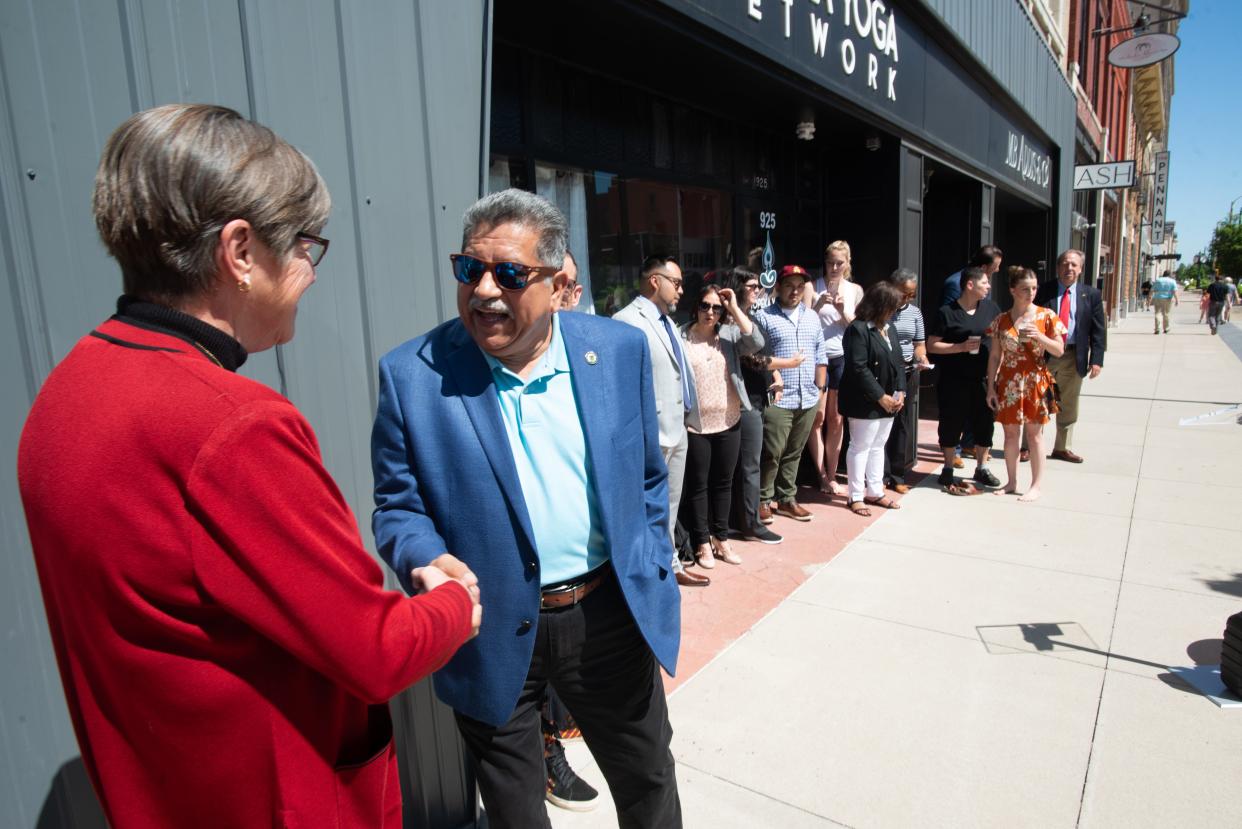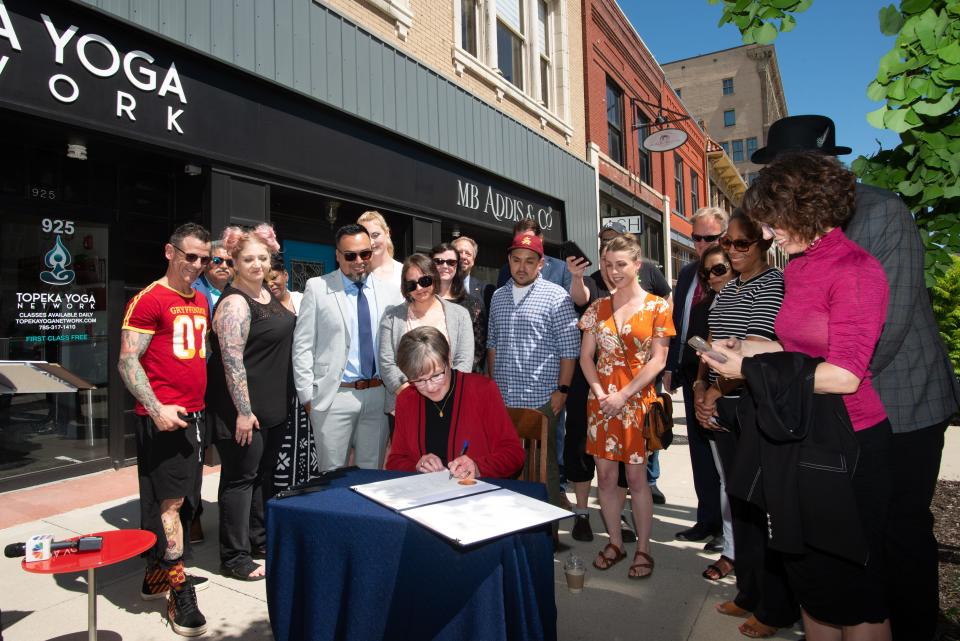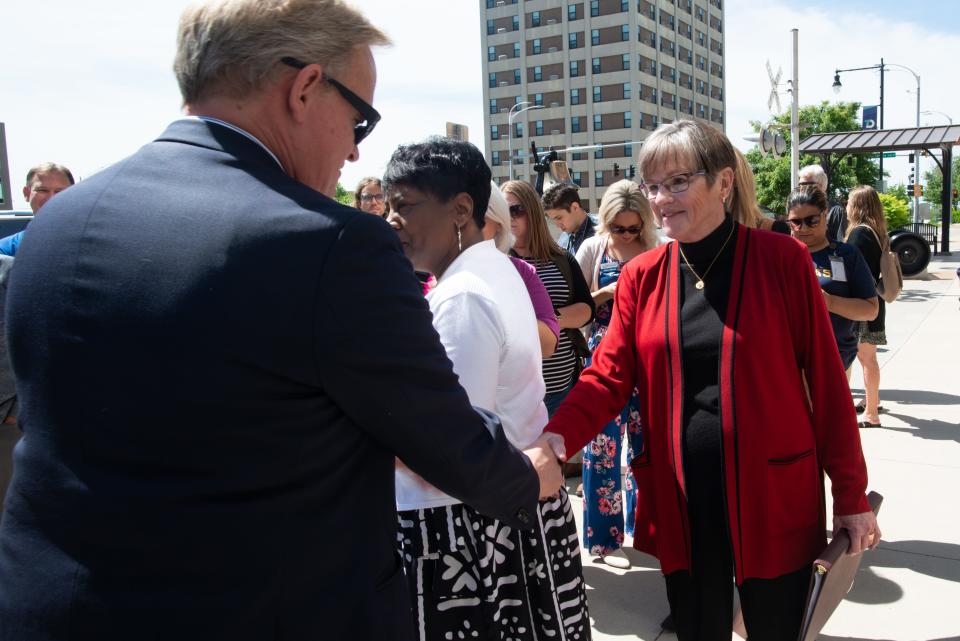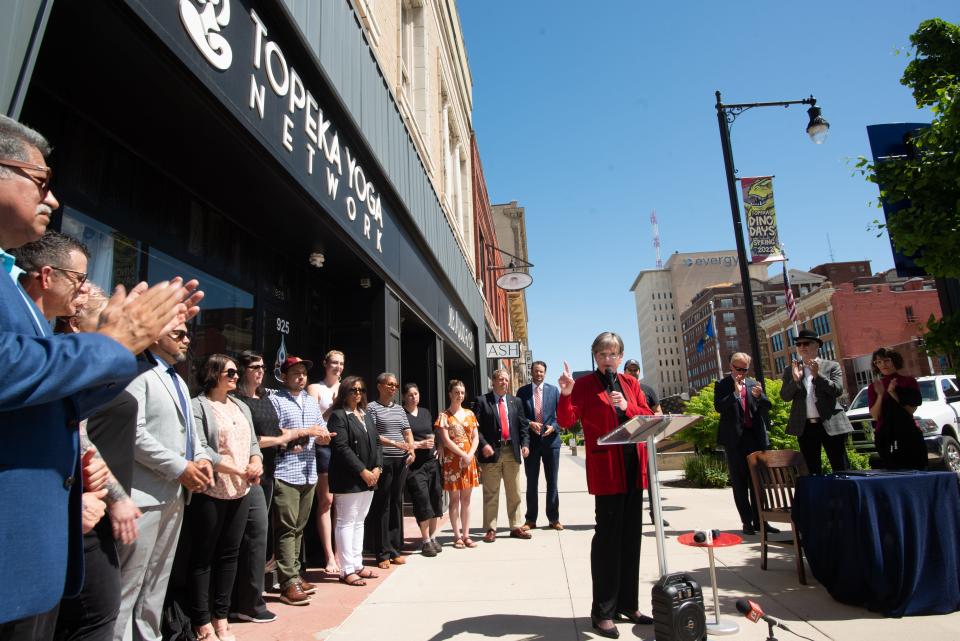Kansas politicians split on whether Gov. Laura Kelly gets credit or blame for small business COVID aid
- Oops!Something went wrong.Please try again later.

Gov. Laura Kelly signed a bill Thursday granting property tax relief to retail storefronts affected by government public health orders during the COVID-19 pandemic.
"There is no better place to sign bipartisan legislation supporting our small business owners that right here in the heart of revitalized downtown Topeka," Kelly said, standing in front of storefronts along Kansas Avenue.
The law, HB 2136, is highlighted by property tax relief for 2020 and 2021 if claimants' small retail businesses were operationally shut down or restricted by a health order. The program is funded with $50 million in federal pandemic aid money.
Calculations depend in part on the length of the health orders and either the property owner's tax payment or a leaser's rent payments. To qualify, retail businesses cannot have received more than $150,000 total in prior pandemic relief. Certain businesses are excluded.
"They represent the beating heart of our economy," Curtis Sneden, president of the Topeka Chamber, said of local small businesses. "And you know, since March of 2020, that heart has been under a lot of strain, hasn't it?"
Many businesses continue to struggle in the economic recovery from the pandemic.
"We are so grateful that the Legislature and our governor decided and took the effort to ensure this measure of relief be made available to some of those small businesses so that they got just a little bit more to get him through the fight," Sneden said.
Kansas Chamber lobbyist Eric Stafford said, "Small businesses largely carried the burden of the pandemic, the economic shutdown of 2020."
Does Laura Kelly get credit or blame for relief?

Kelly said that small businesses "need relief, and they need it now." She said signing the bill is "one more way my administration is working to make Kansas the most pro-business state in the country."
Sen. Caryn Tyson, R-Parker and the tax committee chair, predicted last week that Kelly would take credit for the bill.
"The COVID relief portion, this is so important," said Tyson, who is running for state treasurer. "We had businesses that were shut down by our governor. She's going to take credit for giving them property tax relief here. You guys, don't buy into that narrative. It is a false narrative. She is the reason that we have to pass this legislation."
Kelly told reporters that she knew "there was a lot of hurt experienced" during the early days of the coronavirus pandemic when she issued a shutdown order.
"My first thought was to protect the lives of Kansans, so that's why I did that," Kelly said. "As soon as it was clear that we could start reopening and re-energizing our businesses, we did that."
The legislation passed the Senate unanimously and with only one no vote in the House. While some politicians lauded it as bipartisan work, some Democrats offered more lukewarm support.
Sen. David Haley, D-Kansas City, called the bill an "adequate response" for affected businesses while maintaining that "responsible" government public health orders were "necessary to quell a raging pandemic."
Past attempts had mixed success

Legislative efforts to get government money to compensate businesses for public health orders were in large part a reaction to a 2020 lawsuit and threats of additional litigation. But similar efforts to get bills passed last year had mixed results.
Some Republicans argued last session that compensation should come from local budgets — a prospect that some officials said would result in higher local taxes.
"They've got to feel pain," Sen. Mark Steffen, R-Hutchinson, said of the governments that imposed health orders that affected the economy.
Kelly vetoed SB 273 last year, and Republican lawmakers made no attempt to override the veto. The governor said the small business relief legislation was well-intentioned, but violated American Rescue Plan Act rules.
In addition, Kelly signed HB 2313, which provided for property tax relief for businesses shut down during a future emergencies.
More: Kansas faces pressure to compensate COVID-hurt businesses — or battle a wave of lawsuits
Some politicians wanted more tax cuts

The bill also contained tax provisions granting sales tax authority to Atchison County, delayed the implementation a sales tax exclusion for delivery charges until next year and eliminated a sales tax remittance requirement for retailers.
Those select tax provisions in HB 2136 were repackaged at the behest of House GOP leadership as policymakers dropped additional tax cuts that had previously been negotiated with senators in another bill, HB 2597.
Those proposals included tax relief on retirement incomes and Social Security benefits, exempting utilities from sales taxes and making a cost of living adjustment to the standard deduction, among other policies.
In the Senate, Republicans and Democrats joined to pass HB 2597 on the last day of the session, knowing the vote nothing more than symbolic because the House had already adjourned.
Many politicians expressed disappointment that they didn't pass more tax cuts in a year when surplus tax revenues left a substantial ending balance. Democrats in particular were frustrated that a gradual food sales tax cut won't go into affect until next year.
Tax revenues beat estimates again

The bill signing came one day after the Kansas Department of Revenue reported that tax collections again beat economist projections.
Total tax collections in May were about $910 million. That's about $240 million, or 35.7%, higher than the estimate. Individual and corporate income tax collections accounted for much of the excess revenue, though sales tax receipts also beat the estimate.
Jason Tidd is a statehouse reporter for the Topeka Capital-Journal. He can be reached by email at jtidd@gannett.com. Follow him on Twitter @Jason_Tidd.
This article originally appeared on Topeka Capital-Journal: Kansas passes law to use COVID funds for compensating small businesses

